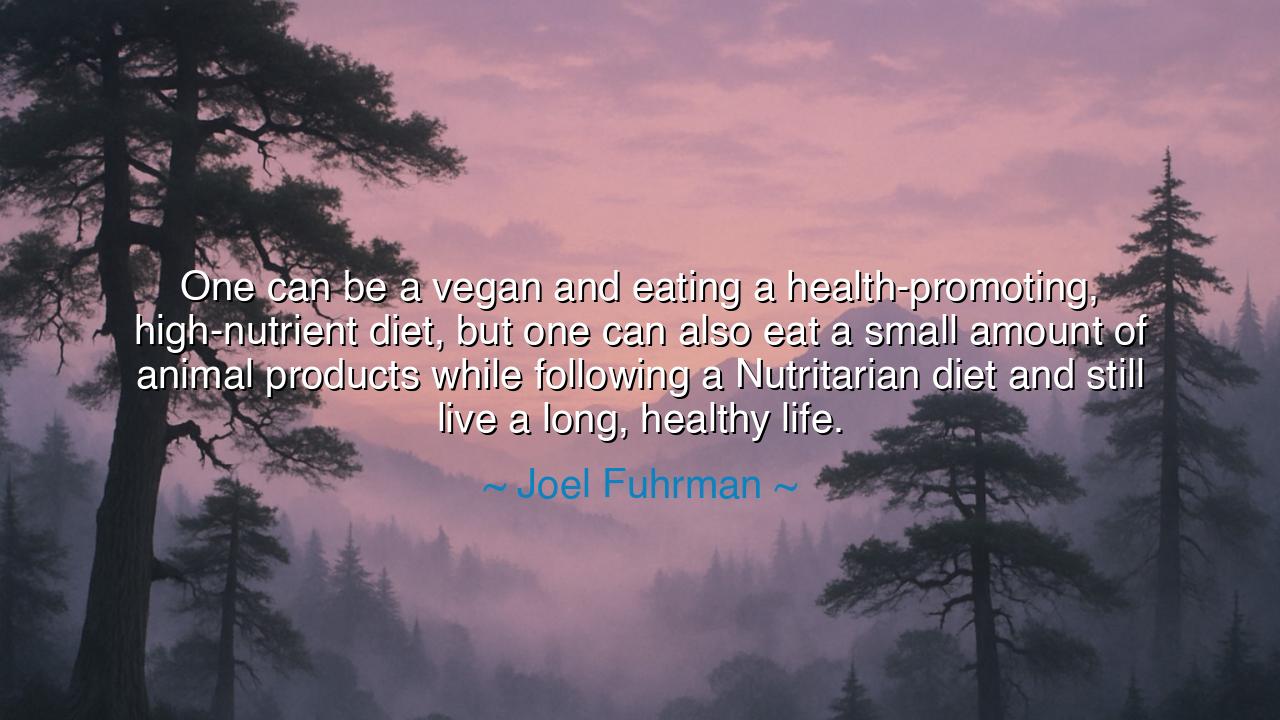
One can be a vegan and eating a health-promoting, high-nutrient
One can be a vegan and eating a health-promoting, high-nutrient diet, but one can also eat a small amount of animal products while following a Nutritarian diet and still live a long, healthy life.






In the wise and balanced words of Joel Fuhrman, we are given a teaching that bridges two worlds often seen as opposites: “One can be a vegan and eating a health-promoting, high-nutrient diet, but one can also eat a small amount of animal products while following a Nutritarian diet and still live a long, healthy life.” This truth, simple yet profound, speaks not merely of food, but of moderation, wisdom, and harmony—virtues that the ancients themselves held sacred. For Fuhrman does not preach the extremes of abstinence or indulgence, but the golden middle path, where nourishment is guided by awareness, not ideology.
The meaning of this quote lies in its understanding of health as a symphony, not a single note. Fuhrman teaches that the Nutritarian diet—a diet centered upon foods rich in vitamins, minerals, and phytonutrients—honors the body’s design by giving it the tools it needs to thrive. Within such a framework, he acknowledges that life allows diversity; that perfection is not purity, but balance. One may walk the path of veganism and find great health, or include small amounts of animal foods and still flourish—provided the foundation is one of nourishment, not excess. This is the wisdom of a mind that sees beyond division to the unity that underlies all.
The origin of this understanding reaches back into the philosophies of both East and West. The Buddha, in his Middle Way, rejected the extremes of gluttony and starvation, teaching that the body must be honored, not abused. Likewise, the ancient Greek sage Aristotle spoke of the “Golden Mean,” the state of virtue found between extremes. Fuhrman’s teaching is a modern reflection of these ancient truths. He reminds us that health is not won through fanaticism but through mindfulness—that the heart of wellness lies not in exclusion, but in understanding.
Consider the example of the Okinawans, a people famed for their longevity. Their diet, though largely plant-based, includes small amounts of fish or pork, consumed sparingly and with reverence. Their plates are filled not with excess, but with color—leafy greens, sweet potatoes, and fermented foods that nourish body and spirit alike. Their secret is not extremism, but moderation guided by gratitude. They eat not to indulge, but to live; not to dominate the body, but to sustain its balance. In this, they embody Fuhrman’s message: that the key to life is not in rigid exclusion, but in intentional nourishment.
Joel Fuhrman’s wisdom also challenges the illusion that health can be measured by labels alone. One may call oneself vegan, vegetarian, or omnivore, yet still fall to illness if the diet lacks true vitality. To eat processed food, even if plant-based, is to stray from the essence of nature’s design. Conversely, one who eats small portions of animal food within a sea of greens and fruits may still live long and free of disease. The quality of food—its nutrient density, its purity, its harmony with life—is what determines health, not the dogma behind it. As the ancients taught, “What matters is not what enters the mouth, but the spirit with which it is received.”
This teaching is not merely about diet—it is about how one walks through life. Extremes divide, but balance heals. When one eats with mindfulness, gratitude, and simplicity, the act of nourishment becomes sacred. Food ceases to be fuel alone; it becomes communion—with the soil, with the sun, and with the very breath of life. Whether one chooses complete veganism or a Nutritarian path that allows modest amounts of animal foods, the heart of the matter remains the same: to live in a way that honors life, sustains health, and cultivates awareness.
So let this be the lesson for all who seek longevity and peace: eat not by ideology, but by wisdom. Fill your plate with color, your mind with gratitude, and your heart with moderation. Do not worship labels, but truth; do not chase trends, but listen to the quiet knowledge of the body. Choose foods that heal, that energize, that uplift. Let your diet reflect the balance of nature—neither rigid nor reckless, but flowing, living, whole.
For in the end, Joel Fuhrman’s words remind us that health is not a contest of purity, but a harmony of choices. Life is generous, and so must we be with ourselves—firm in discipline, gentle in understanding. Whether vegan or not, the path to a long, healthy life lies in honoring the law of balance, the eternal wisdom of moderation, and the sacred covenant between nourishment and life itself.






AAdministratorAdministrator
Welcome, honored guests. Please leave a comment, we will respond soon